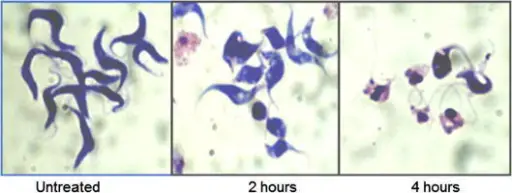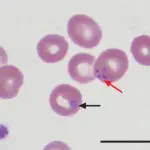African trypanosomiasis Infection is an infection with protozoa of the species Trypanosoma brucei, transmitted by the bite of a tsetse fly.
What is the Pathology of African Trypanosomiasis Infection?
The pathology of african trypanosomiasis infection is:
-Etiology: The cause of african trypanosomiasis infection is microscopic parasites of the species Trypanosoma brucei.
-Genes involved: Not applicable.
-Pathogenesis: The sequence of events that lead to african trypanosomiasis infection are infected tsetse inoculate metacyclic trypanosomes into the skin of animals, where the trypanosomes reside for a few days and cause localized inflammation chancres. They enter the lymph and lymph nodes, then the bloodstream, where they divide rapidly by binary fission and cause tissue damage.
-Morphology: The morphology associated with african trypanosomiasis infection shows a single flagellum and a compact disc of mitochondrial DNA termed the kinetoplast.
-Histology: The histology associated with african trypanosomiasis infection shows ganglionitis with neuronal cell depopulation, fibrosis and mast cell infiltrates are also present.
How does African Trypanosomiasis Infection Present?
Patients with disease in lower case typically are all genders of all ages. The symptoms, features, and clinical findings associated with african trypanosomiasis infection include fatigue, swollen lymph nodes, aching muscles, severe headaches, irritability, and fever.
How is African Trypanosomiasis Infection Diagnosed?
African trypanosomiasis infection is diagnosed by blood sample, bone marrow aspirate, and cerebrospinal fluid.
How is African Trypanosomiasis Infection Treated?
African trypanosomiasis infection is treated by medications suramin, pentamidine, melarsoprol, or eflornithine
What is the Prognosis of African Trypanosomiasis Infection?
The prognosis of african trypanosomiasis infection is fair to poor. It may be fatal if not treated.



